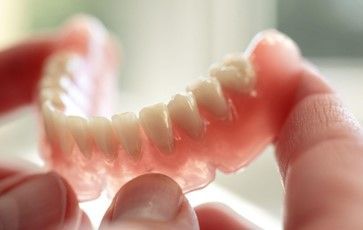Cold Sensitivity, Your Teeth, and Gum Disease
Admin • February 27, 2020
Do you have sensitive teeth? If a chilly glass of ice water makes you wince, take a look at the answers to the top questions dental patients have about cold sensitivity and why it may come from your gums.
What Is Cold Sensitivity?
Dental discomfort comes in many forms. You could have pain, irritation, or sensitivity. As the name implies, cold sensitivity includes:
- Sensitive teeth. Not all dental patients feel sensitivity the same. You may feel a stabbing pain, a shock, or a nagging discomfort.
- A reaction to cold. Your teeth may feel completely pain-free for most of the day. That is, until you eat or drink something cold.
- Possible other discomfort. Some, but not all, patients also experience gum pain or other types of dental discomfort. This may happen due to other issues, such as periodontal disease or dental decay.
If you think your dental pain is a form of cold sensitivity, read on for more information on potential causes and what you can do to correct them.
What Causes Cold Sensitivity?
Whether you drink an icy beverage or eat a frozen treat, the cold item isn't the cause of the sensitivity. Instead, an underlying issue is the culprit behind this dental pain. The most common reasons for cold sensitivity include:
- Enamel erosion. The hard, protective layer on your teeth prevents nerve exposure. But when it wears down, the unprotected nerves can cause major issues when you eat or drink cold items. Acidic foods and dental decay can cause this issue.
- Over-brushing. Forceful brushing can leave nerves exposed and lead to cold sensitivity.
- Dental product ingredients. Some toothpaste and whitening product ingredients (such as chemicals or alcohol) may increase sensitivity. This is typically temporary and will stop after you discontinue use.
Along with these issues, gum disease another common cause of cold sensitivity. Unlike over-brushing or product-related cold sensitivity, you'll need to do more than stop a regular dental activity to correct this problem.
How Can Gum Disease Cause Cold Sensitivity?
What does a gum issue have to do with a tooth problem? When one part of your mouth isn't healthy, it can affect other areas of the mouth. In this case, gum disease can:
- Cause the gum tissue to separate from the teeth. When this happens, pockets form and bacteria to breed under the gumline and can lead to sensitivity.
- Leave roots exposed. The more the gum tissue the decays, the less protection it has. Left unprotected, your exposed roots are subject to sensitivity when you eat or drink cold substances.
- Leave nerves exposed. Like with enamel erosion, gum disease-related nerve exposure can cause cold sensitivity.
If you have cold sensitivity coupled with bleeding, red, swollen, or painful gums, periodontal (gum) disease is a possibility. Talk to your dentist about your cold sensitivity and gum disease concerns. The dentist will need to examine your mouth before creating a treatment plan.
What Can Dental Patients Do About Gum Disease?
Again, the only way to reduce the effects (or eliminate) cold sensitivity due to gum disease is to treat the underlying cause. If the dentist diagnoses you with this issue, treatment could include:
- Scaling and root planing. This deep cleaning allows the dentist to remove plaque and calculus under the gumline. The dentist will also plane, or smooth, the roots to reduce the risk of a future infection.
- Medications. The dentist may prescribe an antimicrobial mouth rinse, oral antibiotic pills, antiseptic chip, antibiotic gel, or antibiotic microspheres.
- Surgery. If other options don't work, an oral surgeon may need to surgically lift a flap of the gum back to clean underneath or graft bone and gum to the affected area.
Some patients may still have some sensitivity after deep cleaning or surgery. If you're still sensitive to cold, you may need to change the dental products you currently use, use a softer toothbrush, eliminate acidic foods, or strengthen enamel with a fluoride treatment.
Do you have cold sensitivity? Contact Advanced Dental Care
for more information.

Missing teeth can affect your daily life, from difficulty chewing and speaking to feeling self-conscious about your smile. If you're struggling with discomfort while eating, trouble speaking clearly, or noticeable gaps in your smile, it may be time to consider dentures or partials. These dental solutions can restore both the function and appearance of your smile, helping you regain comfort and confidence in your daily activities.

Learn effective tips for maintaining your oral health at home, including brushing, flossing, using mouthwash, and making healthy dietary choices. Discover the importance of hydration, regular self-exams, and avoiding tobacco use to keep your teeth and gums in top condition. This guide provides simple steps to help you maintain a healthy smile and prevent oral health problems.
Read this blog to explore the differences between dental crowns and bridges, their purposes, and how to choose the best option for your dental health.

Discover how oral health and overall wellness are connected. Explore how maintaining good dental hygiene can prevent systemic diseases, support heart and diabetes health, enhance digestion, and boost mental well-being. Learn practical tips for integrating dental care into your overall health strategy.
Do you use dentures? Read our blog to learn more about how to maintain your dentures and keep them in top shape.
Read this blog to learn some common dental issues in older adults and what you can do to maintain your oral health as you age so your smile never changes.
Read this blog post to learn more about practicing preventative dental care from a young age with your children. Contact us to find out more.
In this article, you will find six compelling reasons to get a dental checkup before leaving on vacation. Keep reading to learn more.
Many seniors make common oral health mistakes that can have serious consequences for their health. Discover some of the most prevalent oral health mistakes.






